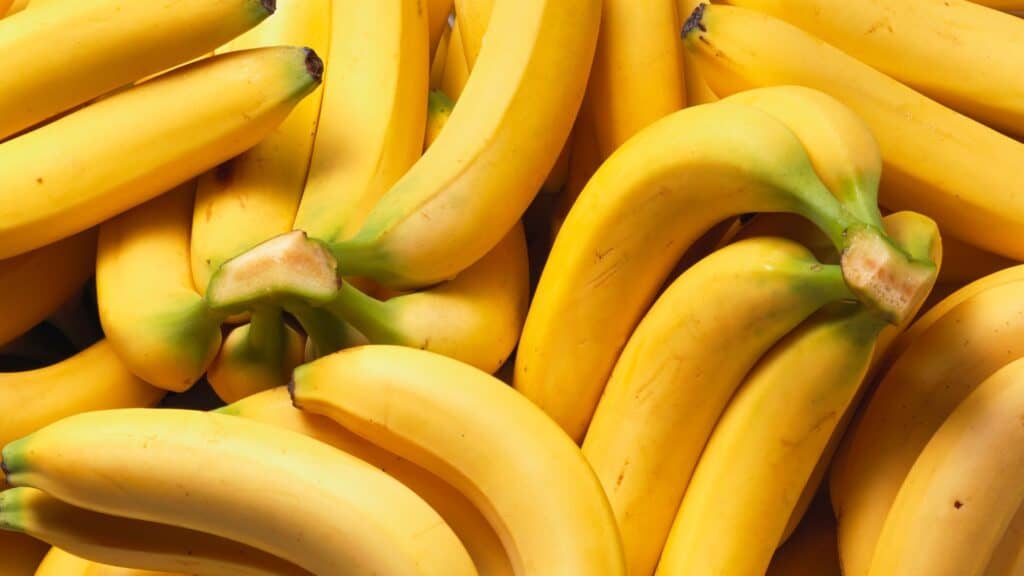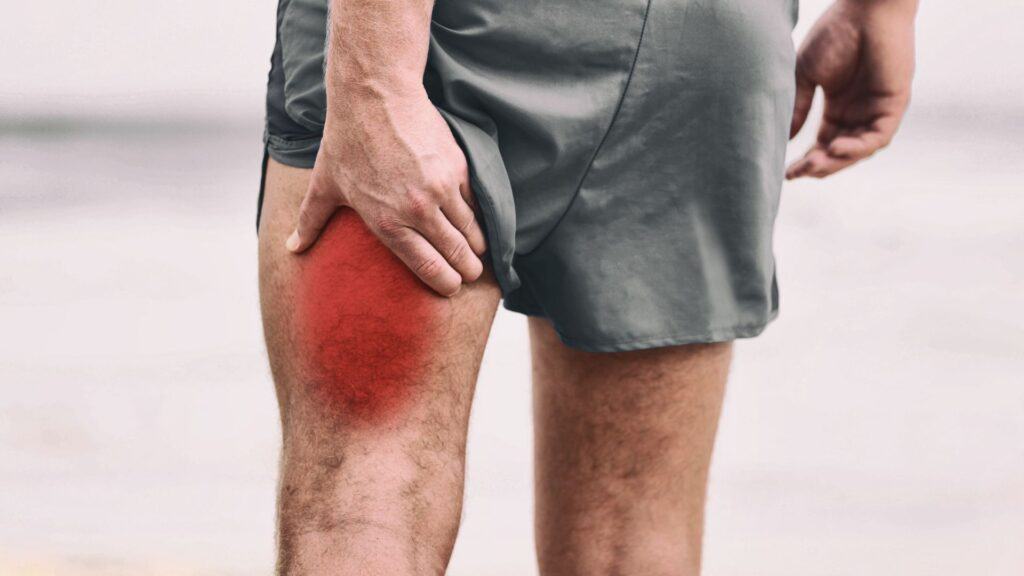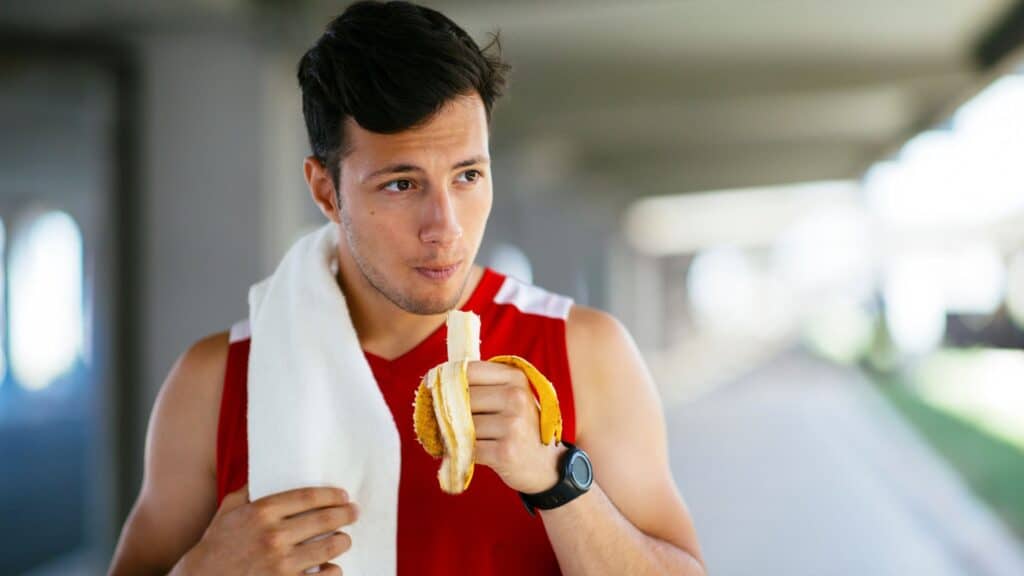If you are susceptible to cramping, chances are that you’ve heard the notion that bananas can help to prevent or relieve leg cramps.
So where did this theory come from and do bananas really help stop leg cramps when you are running?
Bananas do help prevent leg cramps (to a certain extent) because they are rich in several important nutrients including potassium and magnesium. These nutrients play a crucial role in the way our muscles function so getting enough of them is vital for our muscles to work normally.
That being said, there is no scientific evidence to prove that bananas alone prevent your legs from cramping when you run.
There are a number of reasons muscle cramps occur when you exercise and they all play a part to some extent.
Some of the reasons cramps can occur when you run include overuse, muscle fatigue, dehydration, and lack of nutrients.
Therefore eating bananas helps protect against muscle cramps that are the result of improper nutrition and lack of nutrients and electrolytes.
Let’s dive deeper into some of the reasons why leg muscle cramps occur in the first place, how to stop them, and why bananas help…

Why Do Your Legs Cramp
There are several known factors and potential causes of muscle cramps, and the exact mechanisms that lead to cramps in some individuals are not always fully understood.
Cramps can result from a combination of factors, and the specific cause can vary from person to person.
Here are some key factors and theories associated with the causes of leg muscle cramps:
- Electrolyte Imbalances: Changes in the balance of electrolytes, such as sodium, potassium, calcium, and magnesium, in muscle cells can disrupt normal muscle function and lead to cramps. Electrolytes are essential for transmitting signals between nerves and muscles.
- Dehydration: Insufficient fluid intake can lead to dehydration, which in turn can affect electrolyte balance and muscle function. Dehydration can make muscles more prone to cramping.
- Overuse or Fatigue: Excessive use of muscles or muscle fatigue, often seen in athletes or individuals who engage in strenuous physical activity, can lead to cramps. Overexertion can cause muscles to become more susceptible to cramping.
- Nerve Irritation: Nerves that control muscle contractions can become irritated due to factors such as nerve compression, injury, or underlying medical conditions. This irritation can trigger muscle cramps.

- Medical Conditions: Some medical conditions, such as diabetes, kidney disease, thyroid disorders, and peripheral artery disease, can increase the risk of muscle cramps. These conditions can affect nerve function and blood flow, contributing to cramps.
- Medications: Certain medications, including diuretics, statins, and some asthma medications, may list muscle cramps as a potential side effect.
- Cold Temperatures: Exposure to cold weather can cause muscles to contract and spasm, leading to cramps.
- Inadequate warm-up before exercise: Failing to properly stretch (Dynamic stretching) muscles before physical activity can increase the risk of cramps.
Do Bananas Stop Leg Cramps Caused By Poor Nutrition?
Muscle cramps that occur from a lack of good nutrition generally tend to happen spontaneously and often occur at night.
If you experience muscle spasms randomly during the night, you should take a look at your general nutritional intake and try to eat a more balanced diet, making sure you incorporate all the necessary food groups.
Fun fact: Leg cramps are also called a ‘Charley horse’
Legend has it that in the 1880’s when horses were widely used by the groundskeeping staff at baseball diamonds, the Whitesox in Chicago had a lame horse called Charley that used to pull their roller.
Go Bananas With a Well-Balanced Diet
It is difficult to prescribe certain supplements or nutrient-rich foods to help prevent muscle cramps because everyone is different and people need to try and find what works for them and their body.
Making sure you eat a well-balanced diet is important for your general health and helps to ensure that you’re getting all the nutrients and electrolytes your body needs to function properly.
A well-balanced diet includes food from all food groups, which include fruit, vegetables, protein, whole grains, milk, yogurt, and nuts/seeds.
All of these food groups help to fuel your body and are essential if you train or exercise multiple days per week.
Staying hydrated and drinking plenty of water will also ensure that you avoid dehydration which contributes to muscle fatigue and cramps. Sports drinks can also be a good source of minerals during exercise they will also assist with any electrolyte imbalances you may have while running.

Pro Tip: Bananas are a great source of carbohydrates, particularly natural sugars like glucose, fructose, and sucrose. These carbohydrates provide a quick source of energy, making bananas an excellent choice for pre- or post-run fuel. Consuming carbohydrates before exercise can help replenish glycogen stores in the muscles while consuming them after exercise can aid in recovery.
4 Minerals That Prevent Leg Cramps & The Foods That Contain Them
1. Sodium
Sodium contributes to blood pressure and regulates the body/fluid balance. It also plays a role in muscle contraction. You should get your sodium from natural salt or foods such as celery, beetroot, pickled food, olives, carrots, and cheese.
2. Potassium
Potassium is one of the main electrolytes found in the cells of the body and is one of the reasons that people suggest to eat bananas, which are rich in potassium. This nutrient is essential for proper nervous system function as well as muscle function. Potassium also aids in electrical impulse generation, which is the reason that your muscles will cramp if you’re not getting enough of it.
Potassium can be found in fruits and vegetables, especially bananas, avocados, citrus (Orange juice is a great source of potassium), black beans, potatoes, sweet potatoes, and pumpkins. It can also be found in fish and dairy products.
3. Magnesium
A lot of magnesium gets stored in our muscles. It is used in the contraction and relaxation of the muscles and also helps to balance out electrolytes, protein synthesis and the production of energy.
Make sure you eat foods like legumes, avocado, bananas, dark leafy greens, nuts and seeds, and natural yogurt to make sure you get enough magnesium.
4. Calcium
Calcium aids many parts of the body and helps your muscles to function smoothly. Calcium is found in dairy products and nuts/seeds.
So in conclusion, bananas definitely play a role when it comes to preventing leg cramps. Eating them will help reduce the odds of your legs cramping while running but they are only a small piece of the puzzle. More than anything a well-balanced diet, that includes bananas will go a long way to preventing muscle cramps.



Comments are closed.